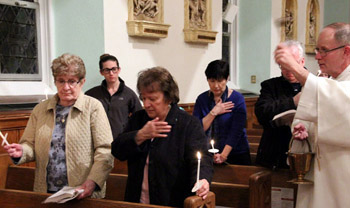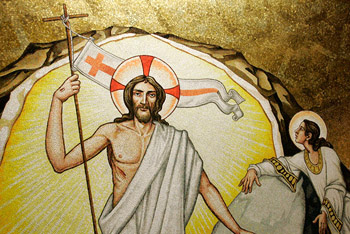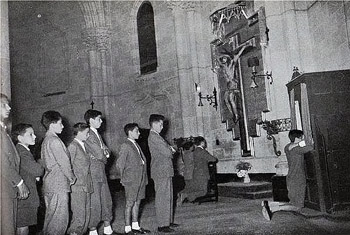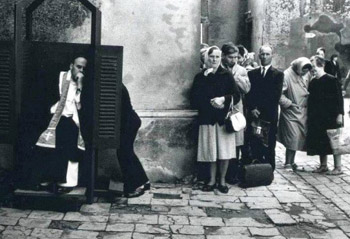Discouraging Confession during Easter Vigil
So, what exactly was the point of the Renewal of Baptismal Promises in the Easter Vigil?
All modern commentaries concur that it is “very important” to renew liturgically our baptismal vows, but it is remarkable that not a single valid reason has been adduced as to why – which is hardly surprising, since there was no need for it in the first place, as Dom Capelle had stated.
More false rationalizations
So, in the absence of a reason, a rationale had to be invented.

A deacon blesses the people after renewal of the baptismal promises
This was provided by one of the Commission members, Fr. Joseph Löw.
Using an expression taken directly from Dom Virgil Michel, he stated
that the purpose of the reform was to “stir up again a proper
Baptism-consciousness” so as “to restore the full significance of
Easter” by “bringing the feast of Easter to life again in its totality.”
(1)
The clear implication of these words is that the true meaning of the Easter Vigil had been obscured and mutilated in the liturgy since the time of the first Christians – and it would be the task of the Commission to bring the Church back to those early centuries.
A grotesque smear
Quite apart from the insinuation that the Church’s ceremonies, prayers, readings and chants for Holy Saturday had been deficient, even moribund, for over 1600 years, these words, written in 1953, reveal something more sinister about the Commission.
Here we can discern the dim outline of that hermeneutic of discontinuity with Tradition that was being planned, whereby the very forms used from generation to generation were judged to be dispensable. Thus, the radical reconstruction of the Easter Vigil and the abolition of some of its ceremonies were the precondition for that control-by-committee, which would be the hallmark of all future developments in the liturgy.
Interrupting traditional patterns
In all the preceding centuries, the Easter Vigil was regarded as the culmination of Lent, a long period in which the faithful focused intensely on sin, penance and personal conversion as a preparation for the spiritual renewal associated with Easter. This is why the custom arose of making a “good Confession” on Holy Saturday evening.
The main point of the Easter Vigil was, therefore, always understood to be a penitential preparation for receiving the graces of Christ’s Resurrection.

Baptism is given prominence over the Resurrection
Not so, however, in the parallel universe of the 1948 Commission. In
Chapter 3 of the “Memo,” Fr. Antonelli explained that they made the
theme of Baptism the centre of the Easter Vigil. Fr. Löw stated that
Baptism was “the most important part of the Vigil celebration” and that
our Renewal of Baptismal Promises was, “above all,” its highlight. (2)
But, it was never the intention of the Church, even in early Christian times when large numbers of catechumens were baptized at the Easter Vigil, to give the theme of Baptism prominence over the Resurrection. In the pre-1956 Missal, the administration of Baptism during the Vigil was simply an option. (3)
Discouraging Confession at the Easter Vigil

Youth line up for confession, once an important part of the Easter Week
Before the 1956 reforms, long lines of penitents were a familiar sight
in every church on Holy Saturday evening, and priests devoted 6 or 7
hours to hearing their confessions, sometimes until midnight. Changing
the Easter Vigil ceremonies to the evening hours, therefore, gave rise
to a major problem of the Commission’s own making: how to stem the great
influx of people into the churches for Confession on the holiest night
of the year.
When the Congregation of Rites issued a Decree in 1952 renewing the experimental Vigil for another three years, its regulations explicitly ordered that parish priests should advise the faithful to choose other days instead. (4)
The politics of hypocrisy & cynicism
It was only a derisory solution. Traditionally, the other days of the Triduum were fully occupied either with liturgical services or popular devotions related to Holy Week. Fr. Löw assured the faithful that they could go to Confession on Holy Saturday morning, which, in the new dispensation, would be free. (5)
But, this conflicts with his previous assertion a few lines earlier that the Vigil was moved to the evening because “the hours of morning are in the case of many Catholics impossible for church services” on account of their work schedules. (6)
What exposes the hollowness of his principles is the fact that he was even prepared to leave the majority of penitents stranded without Confession, as priests would no longer be available to minister to them. What is “pastoral” about preventing people from accessing the Sacrament of Confession at a time that was most convenient for them?
So much for the “pastoral” concern behind the reform. Fr. Löw airily dismissed the problem on the grounds that “through proper instruction and training of the faithful” they would be made to accept the new ways.
More traditions broken on the wheel of Progressivism
A new set of expectations was now in place: The people were to renew their baptismal promises instead. Fr. Löw described the new rite as “the best condition for a good spiritually fruitful celebration of Easter Sunday.” (7)

Even in the streets, lines of penitents would form to make their Easter confession
But what about the Sacrament of Penance which, according to Tradition,
was considered the optimal means of preparing for Holy Communion at
Easter? It was totally eclipsed by a mere novelty, the Renewal of
Baptismal Promises; and its importance was diminished in the eyes of
priests and faithful by being relegated to a random sometime/anytime
framework. Once again, as we have so often observed, a living bond
connecting the faithful to their past was dangerously frayed.
The same treatment was meted out to the many long-standing traditions and customs, too numerous to mention here, through the wholesale disruption of the timing of the Triduum services in the Holy Week reform. The hostility of the reformers to these customs is evident from Fr. Antonelli’s disparaging remark that “there were too many popular customs especially in connection with Holy Saturday.”(8)
A notable example was the blessing of homes by the parish priest on Holy Saturday evening. This was done on that particular night of the liturgical year in memory of the Old Testament “Passover” or passing of the angel in Egypt and the signing of the door-posts with the blood of the sacrificial lamb.
In spite of its biblical symbolism and the obvious analogy with the true Paschal Lamb whose death enabled mankind to “pass over” from death to eternal life, the Instruction accompanying Maxima Redemptionis (1955) ordered it to be carried out on any day except Holy Saturday evening. (9) Thus, the intrinsic significance of this custom was destroyed.
To be continued
All modern commentaries concur that it is “very important” to renew liturgically our baptismal vows, but it is remarkable that not a single valid reason has been adduced as to why – which is hardly surprising, since there was no need for it in the first place, as Dom Capelle had stated.
More false rationalizations
So, in the absence of a reason, a rationale had to be invented.

A deacon blesses the people after renewal of the baptismal promises
The clear implication of these words is that the true meaning of the Easter Vigil had been obscured and mutilated in the liturgy since the time of the first Christians – and it would be the task of the Commission to bring the Church back to those early centuries.
A grotesque smear
Quite apart from the insinuation that the Church’s ceremonies, prayers, readings and chants for Holy Saturday had been deficient, even moribund, for over 1600 years, these words, written in 1953, reveal something more sinister about the Commission.
Here we can discern the dim outline of that hermeneutic of discontinuity with Tradition that was being planned, whereby the very forms used from generation to generation were judged to be dispensable. Thus, the radical reconstruction of the Easter Vigil and the abolition of some of its ceremonies were the precondition for that control-by-committee, which would be the hallmark of all future developments in the liturgy.
Interrupting traditional patterns
In all the preceding centuries, the Easter Vigil was regarded as the culmination of Lent, a long period in which the faithful focused intensely on sin, penance and personal conversion as a preparation for the spiritual renewal associated with Easter. This is why the custom arose of making a “good Confession” on Holy Saturday evening.
The main point of the Easter Vigil was, therefore, always understood to be a penitential preparation for receiving the graces of Christ’s Resurrection.

Baptism is given prominence over the Resurrection
But, it was never the intention of the Church, even in early Christian times when large numbers of catechumens were baptized at the Easter Vigil, to give the theme of Baptism prominence over the Resurrection. In the pre-1956 Missal, the administration of Baptism during the Vigil was simply an option. (3)
Discouraging Confession at the Easter Vigil

Youth line up for confession, once an important part of the Easter Week
When the Congregation of Rites issued a Decree in 1952 renewing the experimental Vigil for another three years, its regulations explicitly ordered that parish priests should advise the faithful to choose other days instead. (4)
The politics of hypocrisy & cynicism
It was only a derisory solution. Traditionally, the other days of the Triduum were fully occupied either with liturgical services or popular devotions related to Holy Week. Fr. Löw assured the faithful that they could go to Confession on Holy Saturday morning, which, in the new dispensation, would be free. (5)
But, this conflicts with his previous assertion a few lines earlier that the Vigil was moved to the evening because “the hours of morning are in the case of many Catholics impossible for church services” on account of their work schedules. (6)
What exposes the hollowness of his principles is the fact that he was even prepared to leave the majority of penitents stranded without Confession, as priests would no longer be available to minister to them. What is “pastoral” about preventing people from accessing the Sacrament of Confession at a time that was most convenient for them?
So much for the “pastoral” concern behind the reform. Fr. Löw airily dismissed the problem on the grounds that “through proper instruction and training of the faithful” they would be made to accept the new ways.
More traditions broken on the wheel of Progressivism
A new set of expectations was now in place: The people were to renew their baptismal promises instead. Fr. Löw described the new rite as “the best condition for a good spiritually fruitful celebration of Easter Sunday.” (7)

Even in the streets, lines of penitents would form to make their Easter confession
The same treatment was meted out to the many long-standing traditions and customs, too numerous to mention here, through the wholesale disruption of the timing of the Triduum services in the Holy Week reform. The hostility of the reformers to these customs is evident from Fr. Antonelli’s disparaging remark that “there were too many popular customs especially in connection with Holy Saturday.”(8)
A notable example was the blessing of homes by the parish priest on Holy Saturday evening. This was done on that particular night of the liturgical year in memory of the Old Testament “Passover” or passing of the angel in Egypt and the signing of the door-posts with the blood of the sacrificial lamb.
In spite of its biblical symbolism and the obvious analogy with the true Paschal Lamb whose death enabled mankind to “pass over” from death to eternal life, the Instruction accompanying Maxima Redemptionis (1955) ordered it to be carried out on any day except Holy Saturday evening. (9) Thus, the intrinsic significance of this custom was destroyed.
To be continued
- Fr Joseph Löw, ‘We must celebrate the Easter night,’ Worship, March 1953, pp. 7, 10, 11.
- Ibid., pp. 4, 15.
- After the Blessing of the Font, the rubrics state: Si aderunt baptizandi, eos baptizet more consueto (If there are any candidates for baptism, let him [the priest] baptize them in the customary manner).
- “Studeat parochus fidelibus suadere … ad confessiones … in diversis diebus distributis.” (The parish priest must advise the faithful coming to Confession [on Holy Saturday evening] to do so on any other days”). Sacred Congregation of Rites, AAS, 11 January 1952, p. 52.
- Fr. Joseph Löw, ‘We must celebrate the Easter night,’ p. 5.
- Ibid., p. 4.
- Ibid., p. 12.
- La Maison-Dieu, n. 47-48, 1956, p. 238.
- AAS 47, 1955, p. 847.

No comments:
Post a Comment